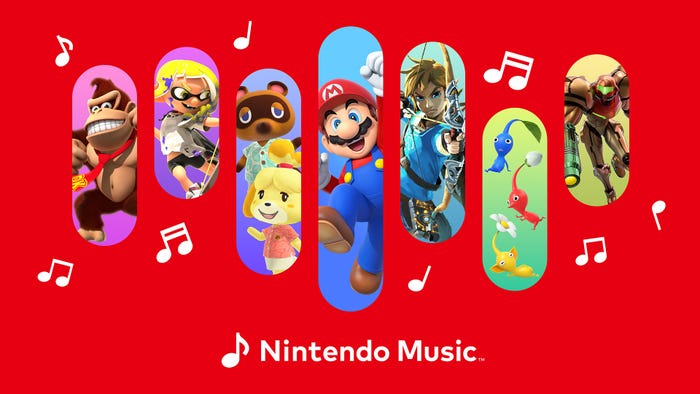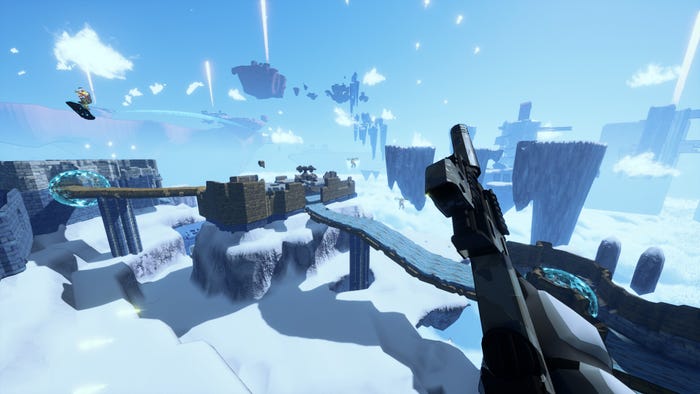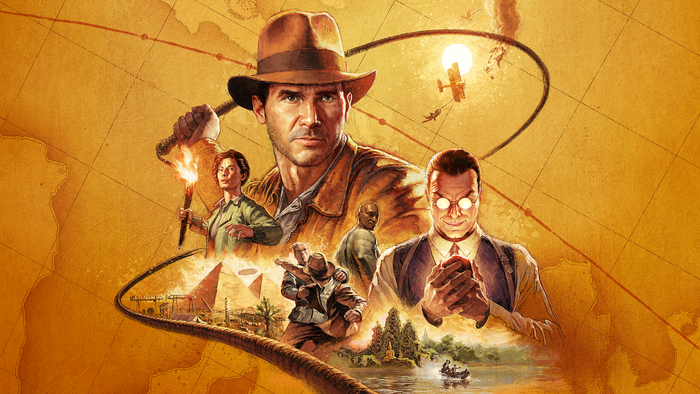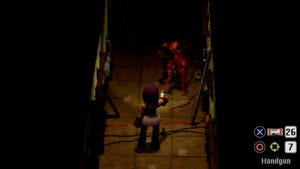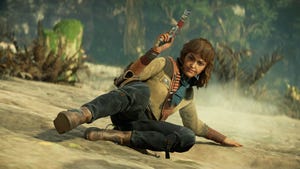A Sense of Fun: Anybody Could Be Your Player 1
In an impassioned opinion piece, seminal Parappa co-creator and 'father of music games' Matsuura talks about his hopes for the future of games as tangible experiences with positive feelings attached.

[In an impassioned opinion piece, recently published in Game Developer magazine, seminal Parappa co-creator and 'father of music games' Masaya Matsuura talks about his hopes for the future of games as 'tangible experiences' with positive feelings attached.]
At the heart of my involvement with video games, I have always been strongly linked to the "music game" genre. While this is often said of me, in reality at the end of the day I am first and foremost a musician looking for ways to expand my creative process, but I guess the end result is the same.
When PaRappa the Rapper was in development at the beginning of the 90s, there were hardly any individuals attempting similar things. After the game's release in '96, similar titles started to become successful sales-wise, which led to greater variation to the extent that these days, "music games" are recognized as being in a genre of their own. But I want to say that we are very far from realizing our potential in this industry.
The past 10 years have seen a number of transitions that have taken the sector to its present condition. I'm delighted to see that lately music games have seen a great surge of interest in the West, thanks to titles like Guitar Hero, Rock Band and SingStar.
I couldn't verify this, but I was told that the Guitar Hero franchise accounted for 20 percent of all game sales in North America last year. Even if that figure isn't accurate, the sales are still astronomical. I can only say that this is an amazing thing.
Ten years ago, when PaRappa was big news, developers from Harmonix visited Japan and showed me some interactive music software that they were working on. I strongly advised them that rather than interactive music software, it had to be a game.
Copycat Curse
The recent success of music games in the West has been based mostly on licensed music. It is necessary to move beyond this. The challenge is to discover the next paradigm in which music and games have a positive and complimentary relationship. I cannot overstate the importance of this. We are currently wasting our use of music.
 Most games these days seem to use gorgeous orchestral soundtracks. While these large-scale soundtracks may generally be lovely to listen to, if we really think about it, isn't it all a bit lacking in imagination? Thinking about it from a simplistic visual perspective, while films are basically just watched, games are interactive.
Most games these days seem to use gorgeous orchestral soundtracks. While these large-scale soundtracks may generally be lovely to listen to, if we really think about it, isn't it all a bit lacking in imagination? Thinking about it from a simplistic visual perspective, while films are basically just watched, games are interactive.
The duties involved and objectives set are also different, so film and games cannot really be the same. And yet, music is basically the same in both. Despite this wonderful opportunity to advance music with this new medium, it seems that new and bold ideas are not encouraged in the current climate.
It's reasonable to think that unimaginative forms of expression will slowly die out as a new form of entertainment matures.
Just looking at the past 10 years we can see that there have been drastic changes in the way we use music, as the media becomes digital, mobile, and more accessible. If we do not make great efforts to ensure progressive use of music in representative mediums, such as games, we could be faced with a steep decline.
The history of music games is still very young. So what is required to ensure the growth of this category? Maybe collaborating with cool musicians would be a good start, and I mean really collaborating, not just licensing music from famous artists.
To all the cool musicians, please take note! I would like you all to dig deep into your own musical expression, and collaborate with other forms in order to extend yourselves.
Gotta Believe
Most musicians create music in their own style, even when they have been asked to make something specific. Many incapable music directors do not even think of starting musical production until after the taste of the game has been decided by the planning, design, and graphics teams. For me, someone who is engaged in this kind of occupation cannot be called a musician.
This applies for more than just music. If you want to create something of value, then you must continue to create for yourself as well. It's the same for designing games. If an artist only works on things that come to him through work, then all he is doing is production.
Development is not coming from within. The scale and scope of the production, as well as the number of people working on the project should not put a damper on this creativity. The possibility of taking the ideas of many and fusing them into one creative expression is to me a wonderful thing.
But it is very difficult to try to unite the varied opinions of a large group of people. As a result, one person's strong opinions and thoughts can go unrecognized or unreflective. Choices in games are generally decided through safety and without risk. Don't you think that this vagueness affects the flow and union of your team and business?
Lately, a lot of developers I know - especially programmers - have told me that they are making small scale games by themselves, independently. To develop something solely from one's own potential is, I believe, a thing of importance. The contents of a game are a combination of passion and energy. If these are becoming sub-ordinate to other factors, then it is game over.
I have come to feel that the music game genre is starting to outgrow itself and is now challenging us to expand its possibilities. It's difficult to describe this, but music really is an art form of abstract elements, which makes me wonder - are games included in these elements?
 Music is mysterious. It often has memories and information attached to it that can be very difficult to separate. To me as a musician, when creating music, I noticed I'm very clear in my own mind about its independent existence.
Music is mysterious. It often has memories and information attached to it that can be very difficult to separate. To me as a musician, when creating music, I noticed I'm very clear in my own mind about its independent existence.
While making music is often an individual creative act, once music enters the physical world it becomes a shared property (see section "Non-competitive Fun, AI, and You"). Its life is no longer under the musician's control. Here we can see a hint about why music is so hard to define.
A Sense of Fun: Positive Emergence
The premise of positive emergence is two entities attaining a mutual standpoint that is equal and fair. On the other hand, if the standpoints have different merits, or are unequal and strongly opposed, then emergence is restricted and instead we experience an unpleasant "negative emergence."
Naturally, it is not an easy matter to simply divide human emotions into positive and negative. In our adult world, there are a vast number of things that obstruct our ability to gain positive emergence with each other.
We often are faced with negative emergence when placed in circumstances that expose our inferiority or inequality, and this brings about stress. War is an extreme example of where these negative thoughts can lead.
I think it's regrettable that we are flooded with games that promote these negative emergences. It may be one of the most straightforward ways to design a game, but I don't think the future is bright for this industry if we continue to focus on games that motivate the player by using gameplay that employs physical attacks as a way of establishing levels of superiority and inequality.
I've said this many times before, but in the future-be it a hundred years or a thousand - children will study 21st century history and the video game boom will be a part of that. But what if it's written like this:
"Back then, video games consisted mainly of people and monsters killing each other, similar to the gladiators of ancient Rome, and were a way to experience and enjoy violent behavior on the TV screen."
-Wikipedia, 3008 A.D.
This is not a history that I want to be associated with. I can understand that the energy of youth can evoke aggressive emotions. However, when I was an amateur musician back in the 80s, I played in a punk band where we wanted to scream our defiance to society, but I soon came to recognize the emptiness of this attitude.
I only had to look at the wonderfully polished work of respected artists to realize this. For those of us who have been in this industry for a while, what can we do to stop our fresh young talents from being misled?
Non-competitive Fun, AI, and You
I am interested in the innate process by which music attains shared ownership. In particular, in the case of children we often see examples of primitive group musical expressions. To create these shared expressions, simple, inherently explainable rules are necessary. These are gleaned through interaction and positive emergence, and this led me to think that there might be a hint here for discovering a new form of music.
Thinking of an example, I saw a dance performed by a group of children from the Republic of Chad in Central Africa. This kind of play can of course be seen in playgrounds all over the world, and leads to an idea of what constitutes "fun." It is hard to explain the rules clearly, but for some reason, even without victory as a goal, players find some kind of enjoyment that is related to their conduct in games.
So why do human beings engage in these seemingly meaningless actions? And furthermore, why are they fun? Keeping these thoughts in mind, I would like to discuss Desmond Morris, a zoologist who published a book called Man Watching in 1991. He talked about a theory called "Postural Echo."
Nowadays, I hear that there are a number of arguments against Morris' views, but I think that for the theme that I am interested in, the observations and results have sufficient value, so I would like to paraphrase his definition of Postural Echo: when two friends meet and talk informally they usually adopt similar body postures.
If they are particularly friendly and share like-minded attitudes to the subjects being discussed, then the positions in which they hold their bodies are liable to become even more alike, to the point where they virtually become carbon copies of each other.
This is not a deliberate imitative process - the friends in question are automatically indulging in what has been called Postural Echo, and they do this unconsciously as part of a natural body display of companionship.
Morris asserted that it is an unconscious act in general communication between adults. But in the case of children playing, I wonder - aren't these postural echoes more or less necessary for positive development? Coming to understand rules that you previously didn't know, matching your behaviors in real time-from the beginning we have no way of knowing if we will be successful or not, or even if it will be fun. This kind of behavioral risk-taking, or "positive emergence," is necessary.
Yet for children, their behaviors are not as motivated by judging potential merits. Rather, as Morris suggested, it seems to me that it's more a case of children adapting to the other humans in their surroundings, and behaving appropriately.
If children feel like they have some of this shared emergence, then surely their playing should become more enjoyable. Sharing experiences with a friend, or multiple friends-this "game"-based form of fun is quite enjoyable. It is considered that this phenomenon remains in the sub-conscious even into adulthood.
I heard about a very interesting editing technique by a Japanese film director. He says, for example, when editing commercials, at specific intervals he'll insert a single black frame. At that moment, the audience will blink, without fail. Despite the "partner" in this case not even being human, for some reason humans unconsciously pick up these mimicking behaviors. This is the same if your partner is a computer game.
On the subject of AI, text-based communication like the Turing test soon comes to mind, but I really do think that it is an important mission to try and develop emergent forms of non-verbal based communication such as postural echoing in our relations with computers. I believe that "Kismet," the robotic emotional AI at MIT, is an example that is getting good results.
Introducing Engagement
Video games are a very simple way to enjoy virtual experience. All you need is a TV, a console, a controller, and the software. This is an easy system for everyone compared with other forms of entertainment.
But like Hollywood, in order to keep the customers paying, the industry is using increasingly exaggerated content. Pressing buttons, moving sticks-these are small actions with grand effects. However, I think it is a slight error of judgment in our industry to believe that actions that in reality would carry great responsibility can be carried out in video games without thought for responsibility.
The Wii has come and put a cat amongst the pigeons of this unbalance. The harder you swing the remote, the faster the baseball bat moves. This more organic relation between imagination and reality is easily absorbed.
At the same time we understand that game designs that, for example, require the player to shake the Wii controller strongly to rotate a Tetris block, are unsuitable for input methods like this. The Wii requires a tighter connection between actual and virtual actions. But think! How can we improve on these kinds of obvious connections? That is the hint to make more advanced games.
Currently, we at NanaOn-Sha are working hard on a game [Major Minor's Majestic March] that will hopefully make the best of the Wii platform.
Using the Wii remote for music games seems like a perfect match, but it has many difficulties. Music games need accurate data, quickly-and this is not a strong point of motion sensing controllers.
Instead of focusing on traditional rhythm based gameplay, we decided to let the player control the tempo of a musical performance by waving the baton in a marching band. You can dynamically change the bpm of the performance - a completely new form of music game that would not be possible with digital controllers.
At the same time we have other issues to consider - such as the player physically tiring out or getting bored of repetitive movements - so we've had to come up with many ideas to create an innovative and rewarding experience.
While we are currently working on a game for the Wii, I think that in the near future we will see games leaving our video displays. I'm anticipating an evolution in tangible experiences. You may think it a joke, but I do believe that we will see a day where Street Fighter games see you actually fighting a robot bare fisted.
One day we will look back with embarrassment on this era when all of our virtual experiences were trapped behind a screen. This advance will have great implications for the role of games within society, and the wider possibilities of tangible experiences could make the word "game" insufficient to describe what we are doing. I would like to introduce some examples of things that have led me to think about this.
I created some music for a Japanese automobile company's pavilion at the 2005 Aichi Expo in Nagoya, which was about a futuristic one-man car. On this occasion, we were challenged with creating music that would convey the sense of interaction that a human might feel with a one-man vehicle as an extension of one's body image.
 It is said of existing cars that they are an extension of your body image. We particularly prioritize the ability to travel safely at high speeds on expressways.
It is said of existing cars that they are an extension of your body image. We particularly prioritize the ability to travel safely at high speeds on expressways.
In this kind of dangerous environment, it is natural to want to arm oneself as robustly as possible. I think that the current nature of cars causes us to think in this way.
On the other hand, this vehicle is a one-man vehicle and doesn't make us feel that way. The engine is silent.
Also this vehicle is a high-aspiration concept that envisages multiple units cooperating automatically on the highways, but at the high speeds of current cars. At least from a visual perspective this concept looks a little bit like a video game.
In this kind of environment, of course all kinds of sounds will be necessary for different functions, confirmations and so on. Nowadays with computers, there are a large number of strange alert sounds and so on that ring away, but nobody seems to mind. After all, computers are just boxes that can't move, right?
But when these sounds occur in something like this vehicle, carrying a human passenger and traveling at a high speed, the passenger is unable to stay calm and focused. In fact, if the driver can't quickly understand the meaning of the alert, it's downright dangerous. Therefore, we decided to undertake this experiment with the ambition to expand the borders of music, and with a concept grounded on attempting to communicate these functions of music.
Anybody Could Be Your Player 1
The neurologist Alan Snyder suggests of children with Savant Syndrome that as their knowledge of languages piles up, they lose their natural genius ability to draw incredibly precise pictures. In other words, as the left brain develops we lose our ability to see detail. Extending this to everyday reality, in my head, when I am informed simply of a general idea, I become less inquisitive about it in my heart.
Games are important media that help us actively experience these new ideas. Outside of games, in some other forms of representative media, we require some prior knowledge or expectations in order to understand and feel the contents.
This is not completely necessary in the case of games. You get an interactive reply to your input in an instant and good games can teach you about themselves. But games also have the potential to reach out and affect deep emotions. This is why games are fun, and also important.
I think in today's world we are suffering from a lack of mutual understanding of each other's differences. That games are fostering this rejection of mutual understanding is very saddening to me, particularly as this is the industry that we work in. As I grew up I was heavily influenced by Western culture, and this passion continues to this day.
For this reason, I would like to see Western developers make a bigger effort to develop products that will also appeal to the other markets. Like me, I would like future generations to experience the joys of respecting the culture of different countries.
The Choice is Theirs
I mentioned earlier the idea of positive emergence, and I think that the biggest stimulus for this is the sense of hearing. Even if you don't want to hear it, sound makes its way into our ears, and sometimes this is of course an inconvenience. This is why speech became a way to read and consider your companions and environments.
With games, the player cannot enjoy the product without buying a package or downloading something. Unlike listening, they have a choice. If we are saying things that they don't want to listen to, they can ignore us. So we need to find a language that appeals to everyone, and if we do, then it doesn't matter who your "Player 1" is - it could be anyone.
[Matsuura's DICE 2008 presentation, which this article is partly based on, was recorded and can be seen here. If you just want to see the spectacular audiovisual finale, skip to 40:00 and watch.]
Read more about:
FeaturesAbout the Author
You May Also Like


